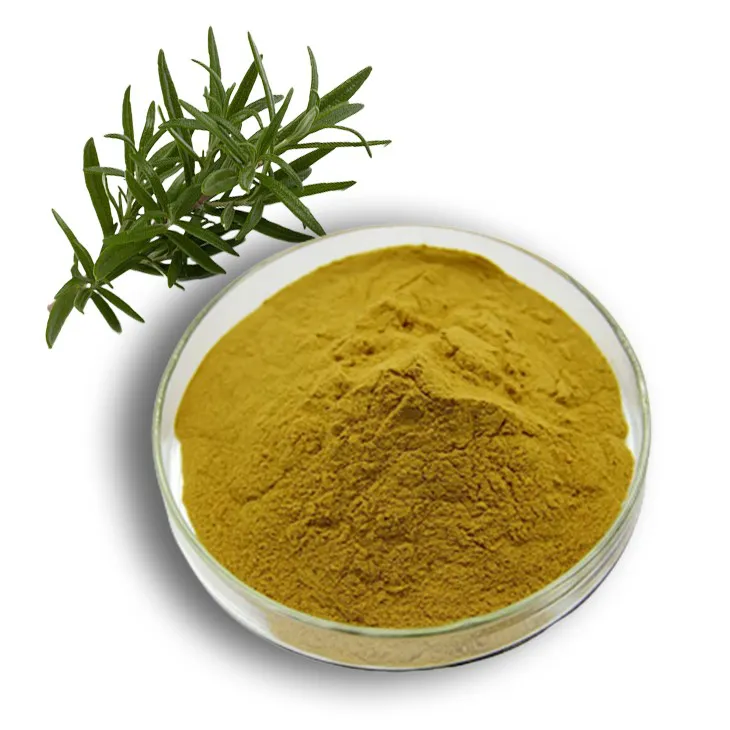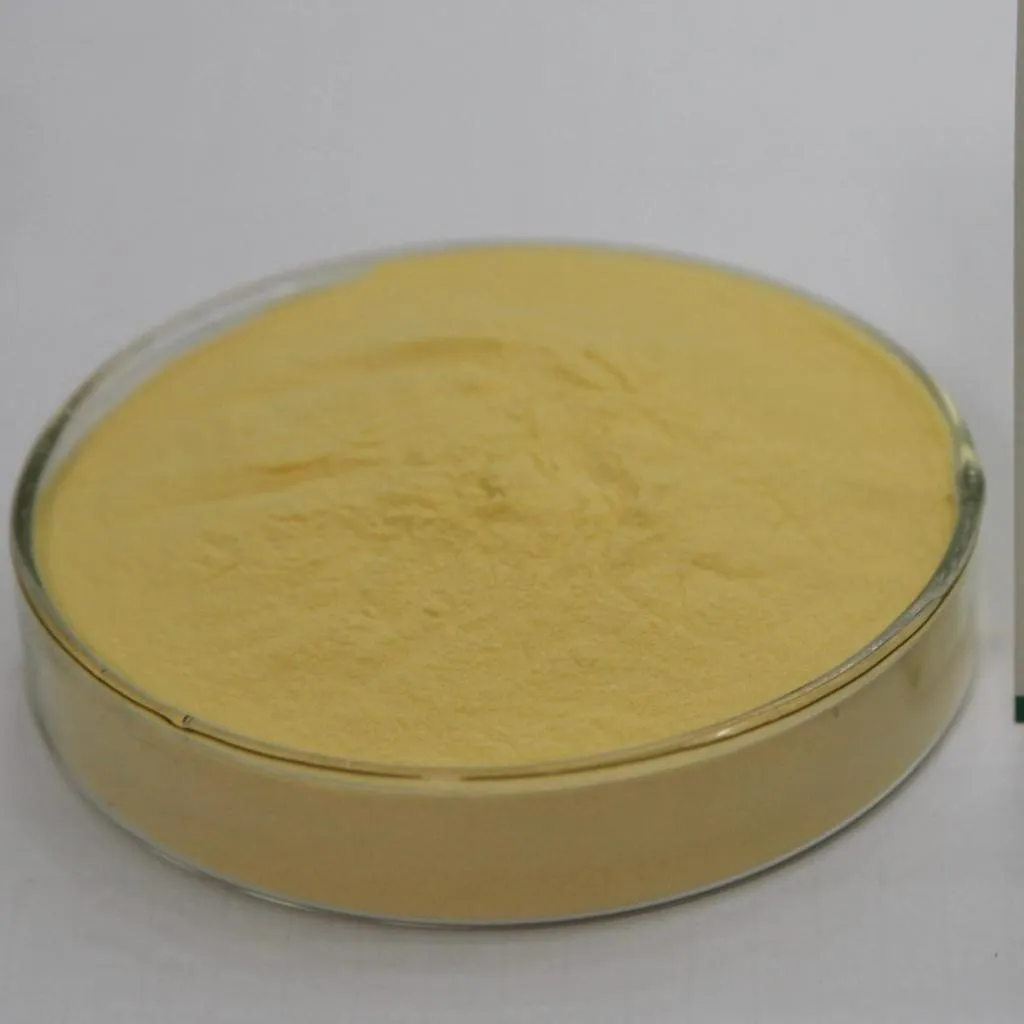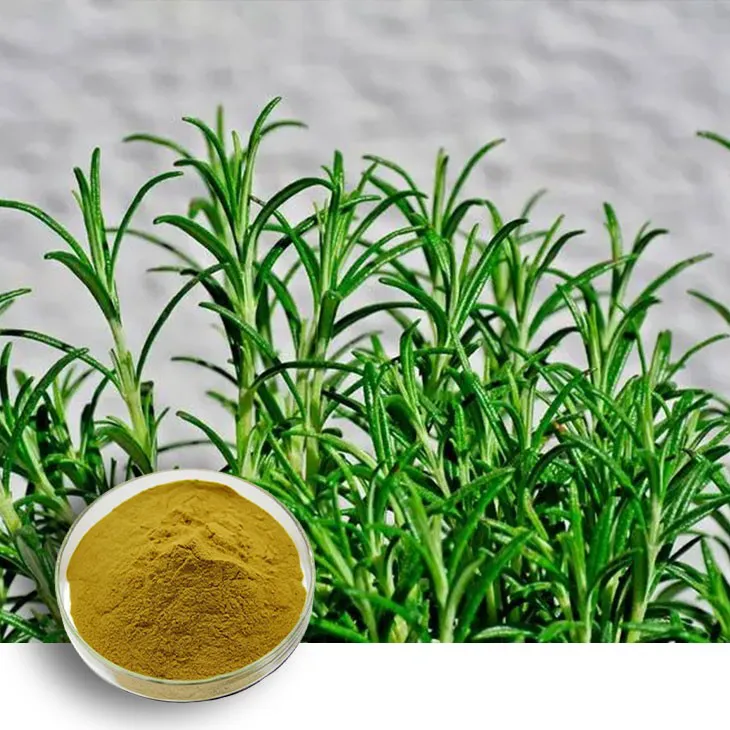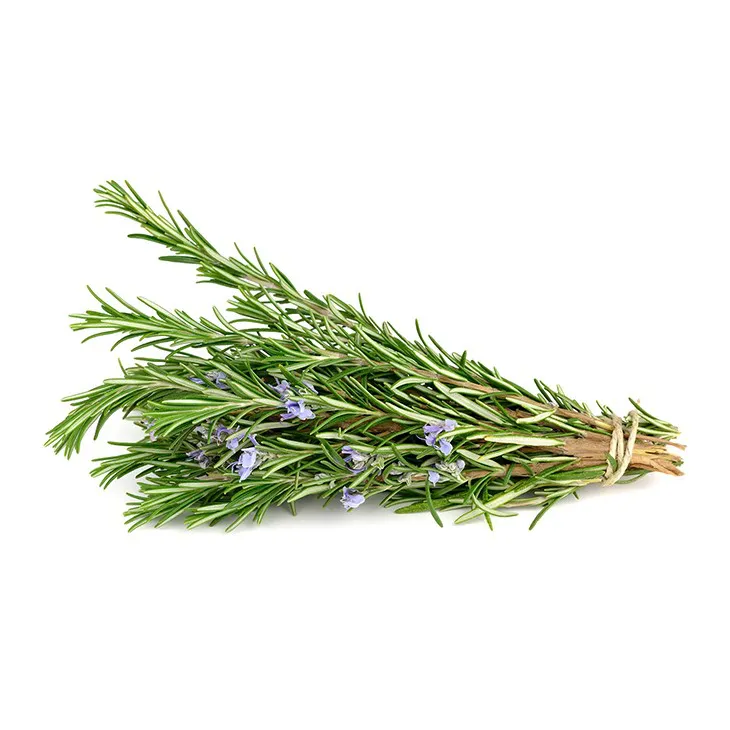- 0086-571-85302990
- sales@greenskybio.com
How do rosemary extract manufacturers wholesale and customize products?
2024-12-18

1. Introduction to Rosemary extract
Rosemary extract is a natural product derived from the rosemary plant (Rosmarinus officinalis). It is rich in various bioactive compounds such as rosmarinic acid, carnosic acid, and carnosol. These compounds endow Rosemary extract with antioxidant, anti - inflammatory, and antimicrobial properties. Due to these beneficial properties, rosemary extract has found wide applications in multiple industries, including food, cosmetics, and pharmaceuticals.

2. The Wholesale Market of Rosemary Extract
2.1 Distribution Channels
Direct to Businesses: One of the common distribution channels for rosemary extract manufacturers in wholesale is to sell directly to businesses. For example, in the food industry, manufacturers may directly supply rosemary extract to food processing companies. This method allows for more control over the sales process and can often lead to stronger business relationships.
Through Distributors: Another important channel is through distributors. Distributors play a crucial role in reaching a wider market. They have established networks and can distribute the rosemary extract to various regions and different types of customers. For instance, a distributor might supply the extract to small - scale cosmetic manufacturers who may not have the capacity to deal directly with the extract manufacturer.
Online Platforms: In the digital age, online platforms are also becoming an increasingly popular way for wholesale. Manufacturers can list their rosemary extract products on B2B e - commerce platforms. This gives them access to a global market, allowing potential customers from all over the world to discover and purchase their products.
2.2 Competitive Pricing in Wholesale
Cost Factors: The pricing of rosemary extract in the wholesale market is influenced by several cost factors. The cost of raw materials is a significant component. If the cost of rosemary plants, which are the source of the extract, increases due to factors such as poor harvests or changes in agricultural policies, the price of the extract is likely to go up. Additionally, production costs, including extraction processes, quality control, and packaging, also impact the wholesale price.
Market Competition: In a competitive wholesale market, manufacturers need to consider the prices offered by their competitors. If a competitor offers a similar quality of rosemary extract at a lower price, the manufacturer may need to either adjust its price or find ways to differentiate its product. For example, a manufacturer might emphasize the superior quality or unique properties of its extract to justify a slightly higher price.
Volume - based Pricing: Many rosemary extract manufacturers also use volume - based pricing in wholesale. Larger orders are often offered at a lower per - unit price. This encourages customers to buy in larger quantities. For example, a food company that requires a large amount of rosemary extract for its production line may be able to negotiate a more favorable price per kilogram compared to a small - scale bakery.

3. Customization of Rosemary Extract Products
3.1 Understanding Customer Needs
Industry - specific Requirements: Different industries have different requirements for rosemary extract. In the food industry, for example, the extract must meet strict food safety regulations. It may also need to have a certain flavor profile that is compatible with the food product it is added to. In cosmetics, on the other hand, the extract's compatibility with other ingredients, such as oils and emulsifiers, and its skin - friendly properties are of great importance. Pharmaceutical companies may require a highly purified form of rosemary extract with specific medicinal properties.
Customer - driven Specifications: Some customers may have their own unique specifications for rosemary extract. A high - end cosmetic brand, for instance, may demand a particular concentration of certain bioactive compounds in the extract to achieve a desired anti - aging effect. A food manufacturer may want an extract with a specific antioxidant capacity to enhance the shelf - life of its products.
3.2 Advanced Technologies for Customization
Extraction Technologies: Modern extraction technologies play a vital role in customizing rosemary extract. Supercritical fluid extraction, for example, can be used to obtain extracts with different compositions. By adjusting the pressure and temperature in the supercritical fluid extraction process, manufacturers can selectively extract certain compounds, thus tailoring the extract to meet specific requirements.
Blending and Formulation: Manufacturers can also use blending and formulation techniques to customize rosemary extract products. They can combine the rosemary extract with other natural or synthetic ingredients to create bespoke formulations. In the cosmetics industry, rosemary extract can be blended with other botanical extracts, such as Lavender Extract, to create a unique product with enhanced skincare properties.
Microencapsulation: Microencapsulation is another technology used for customization. This process can protect the rosemary extract from degradation and improve its stability. It can also be used to control the release of the extract in different applications. For example, in a pharmaceutical product, microencapsulated rosemary extract can be designed to release its active compounds slowly over a period of time.

4. Quality Control in Wholesale and Customization
4.1 Quality Standards for Wholesale
In the wholesale of rosemary extract, manufacturers need to adhere to certain quality standards. These standards are often set by international or national regulatory bodies. For example, in the food industry, the extract must comply with food safety regulations such as those set by the Food and Drug Administration (FDA) in the United States or the European Food Safety Authority (EFSA) in Europe. This includes limits on contaminants, proper labeling, and ensuring the identity and purity of the extract.
Manufacturers also need to conduct regular quality control tests on their wholesale products. These tests may include assays for the content of bioactive compounds, such as rosmarinic acid, to ensure that the product meets the specified quality standards.
4.2 Quality Assurance in Customization
When customizing rosemary extract products, quality assurance is equally important. Since customized products are often tailored to specific customer requirements, manufacturers need to ensure that every batch meets those exact specifications. This may involve more stringent quality control procedures, such as additional testing for new or unique ingredients added during the customization process.
Traceability is also a key aspect of quality assurance in customization. Manufacturers should be able to trace the origin of the raw materials, the production processes, and the distribution channels of the customized rosemary extract products. This helps in case of any quality issues or recalls.

5. Marketing and Promotion of Wholesale and Customized Rosemary Extract
5.1 Marketing Strategies for Wholesale
Trade Shows and Exhibitions: Participating in trade shows and exhibitions is an effective way for rosemary extract manufacturers to promote their wholesale products. These events bring together industry professionals, potential customers, and competitors. Manufacturers can showcase their products, demonstrate their quality, and establish business contacts. For example, at a food ingredients trade show, a rosemary extract manufacturer can display different grades of its extract and explain their applications in various food products.
Product Catalogs and Brochures: Creating detailed product catalogs and brochures is another important marketing strategy. These materials should include information about the product features, quality standards, and applications. They can be distributed to potential customers, either physically at trade shows or electronically via email or on the manufacturer's website.
Online Marketing: In today's digital age, online marketing is crucial. Manufacturers can use their website to showcase their wholesale rosemary extract products. They can also use search engine optimization (SEO) techniques to improve their website's visibility in search engines. Social media platforms can also be used to promote their products, share product - related news and information, and engage with customers.
5.2 Promoting Customized Rosemary Extract
Case Studies and Testimonials: For customized rosemary extract products, case studies and testimonials can be very effective in marketing. By sharing success stories of how a customized extract has solved a specific problem for a customer, such as improving the shelf - life of a food product or enhancing the efficacy of a cosmetic, manufacturers can attract more customers who are looking for tailored solutions.
Customized Marketing Materials: Creating marketing materials specifically for customized products is also important. These materials should highlight the unique features and benefits of the customized extract, how it meets the customer's specific requirements, and the value it adds to the customer's product or process.
6. Conclusion
Rosemary extract manufacturers face a complex but potentially rewarding landscape in wholesale and customization. Understanding the wholesale market, including distribution channels and competitive pricing, is essential for success. Additionally, the ability to customize products using advanced technologies to meet the diverse needs of different industries is a key competitive advantage. Through strict quality control and effective marketing strategies, manufacturers can thrive in this dynamic market, providing high - quality rosemary extract products to meet the growing global demand.
FAQ:
Q1: What are the main distribution channels for rosemary extract manufacturers in wholesale?
Rosemary extract manufacturers may use multiple distribution channels in wholesale. One common channel is through distributors who have established networks with various retailers and end - users. They can also directly supply to large - scale food, cosmetics, or pharmaceutical companies. Another way is via online B2B platforms, which allow them to reach a global customer base. Additionally, some manufacturers may participate in trade shows and exhibitions to showcase their products and establish connections with potential wholesale customers.
Q2: How do rosemary extract manufacturers ensure competitive pricing in wholesale?
To ensure competitive pricing in wholesale, rosemary extract manufacturers first focus on cost - control at every stage of production. This includes sourcing raw materials efficiently, optimizing manufacturing processes to reduce waste and energy consumption. They also keep an eye on market trends and competitors' prices. By economies of scale, as the production volume increases, the cost per unit can be reduced, enabling them to offer more competitive prices. Sometimes, they may form strategic partnerships with suppliers to get better deals on raw materials or with logistics providers to cut down on transportation costs.
Q3: What advanced technologies are used for customizing rosemary extract products?
Manufacturers use various advanced technologies for customization. In the area of extraction, supercritical fluid extraction technology can be employed to obtain high - quality and pure rosemary extract. For formulation customization, high - precision mixing and blending equipment are used to ensure accurate proportions of different components. Analytical techniques like HPLC (High - Performance Liquid Chromatography) are utilized to precisely analyze and control the composition of the extract for different applications. Additionally, encapsulation technology can be used to create customized delivery systems for the rosemary extract in different products.
Q4: How can manufacturers customize rosemary extract formulations for the food industry?
For the food industry, manufacturers need to consider factors such as taste, safety, and regulatory requirements. They can customize the rosemary extract formulation by adjusting the concentration of active compounds to meet the desired flavor profile without overpowering the natural taste of the food. Regarding safety, they ensure that all components are food - grade and comply with relevant food safety regulations. For example, in meat products, they may create a formulation that helps with antioxidant and preservative functions while maintaining the product's sensory qualities. They may also develop water - soluble or oil - soluble formulations depending on the nature of the food product.
Q5: What are the key considerations for customizing rosemary extract for the cosmetics industry?
In the cosmetics industry, key considerations for customizing rosemary extract include skin compatibility, stability, and desired cosmetic effects. Manufacturers need to ensure that the extract is formulated in a way that it is gentle on the skin and does not cause irritation. Stability is crucial, so they use appropriate additives and packaging to prevent degradation of the active compounds. For desired cosmetic effects, if it is for an anti - aging product, they may increase the concentration of antioxidant components in the rosemary extract formulation. If it is for a hair - care product, they may customize it to enhance hair strength and shine.
Q6: How do rosemary extract manufacturers meet the regulatory requirements when customizing for the pharmaceutical industry?
When customizing rosemary extract for the pharmaceutical industry, manufacturers must strictly adhere to regulatory requirements. They need to ensure that the extraction process is carried out under GMP (Good Manufacturing Practice) conditions. The quality control is extremely strict, with every batch of extract being tested for purity, potency, and consistency. Documentation is also a vital part, including the origin of raw materials, manufacturing processes, and quality test results. Any customization has to be in line with the approved pharmaceutical formulations and safety standards set by regulatory authorities such as the FDA in the United States or the EMA in Europe.
Related literature
- Rosemary Extract: Production, Properties, and Applications"
- "The Role of Rosemary Extract in the Food and Pharmaceutical Industries"
- "Customization of Botanical Extracts: A Case Study of Rosemary"
- ▶ Hesperidin
- ▶ Citrus Bioflavonoids
- ▶ Plant Extract
- ▶ lycopene
- ▶ Diosmin
- ▶ Grape seed extract
- ▶ Sea buckthorn Juice Powder
- ▶ Fruit Juice Powder
- ▶ Hops Extract
- ▶ Artichoke Extract
- ▶ Mushroom extract
- ▶ Astaxanthin
- ▶ Green Tea Extract
- ▶ Curcumin
- ▶ Horse Chestnut Extract
- ▶ Other Product
- ▶ Boswellia Serrata Extract
- ▶ Resveratrol
- ▶ Marigold Extract
- ▶ Grape Leaf Extract
- ▶ New Product
- ▶ Aminolevulinic acid
- ▶ Cranberry Extract
- ▶ Red Yeast Rice
- ▶ Red Wine Extract
-
Longan Extract
2024-12-18
-
Mulberry Extract
2024-12-18
-
Giant Knotweed Extract
2024-12-18
-
Okra Extract
2024-12-18
-
Aguaje Extract
2024-12-18
-
Sophora Japonica Flower Extract
2024-12-18
-
Citrus Aurantii Extract
2024-12-18
-
Phyllanthus Emblica Extract
2024-12-18
-
Lemon Extract
2024-12-18
-
Lotus leaf extract
2024-12-18





















